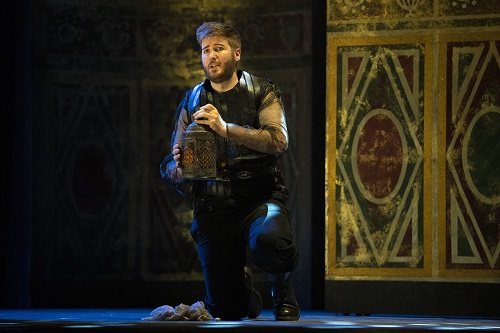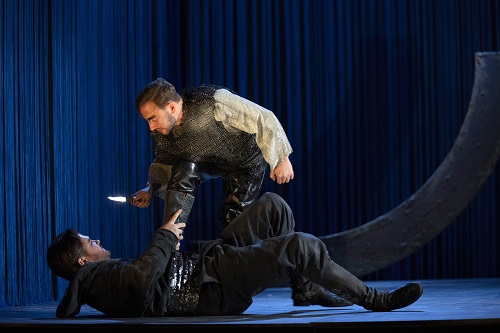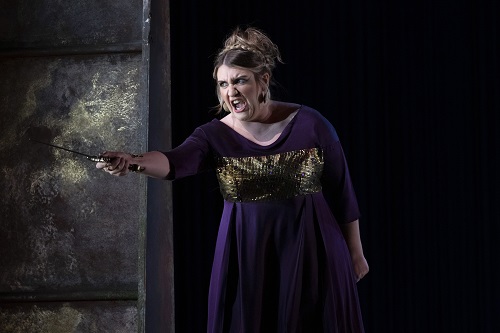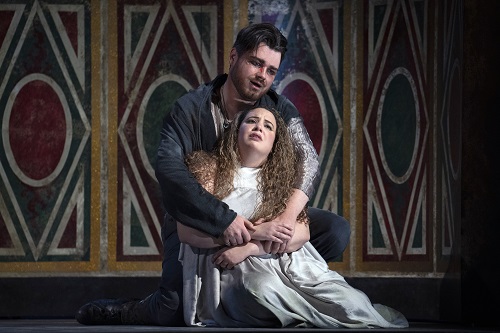In his Welcome to English Touring Opera’s 2022 Autumn Tour, James Conway reminds audiences that ‘[w]hen Handel was writing his operas in the 1720s and 30s, it was the only time that London was the most important a creative centre for opera production in Europe’. Three hundred years later, and with the UK’s artistic landscape scarred by Brexit, the pandemic and economic meltdown, that’s a sobering thought. And, it’s a good reason for Conway, in his final year as Artist Director, to indulge himself and us with a ‘Handelfest’, mounting three operas by the composer whose work the director has returned to many times during his twenty years with the company. Alongside his 2013 production of Agrippina, Conway is presenting a new production of Tamerlano, and also returning to Ottone, first seen in 2014 and which opened this season’s tour at the Hackney Empire.
As Conway suggests in his Director’s Note, Ottone is perhaps more concerned with emotion, psychology and identity than with ‘drama’, and his sensitive and insightful direction allows each of the opera’s characters to both express and explore a diversity of human feelings and fears, as they seek to understand themselves and their relationships with those close to them – siblings, lovers, mothers and sons.

There are plenty of confusions, misunderstandings and separations for the characters to negotiate and overcome. The eponymous Saxon king and Holy Roman Emperor struggles to hold onto both his kingdom and his betrothed, the Byzantine princess, Teofane. His bride-to-be is duped by Gismonda and her son, Adelberto – who have carried out a coup d’état when Ottone is absent, defending the ship bringing Teofane to Italy when it is attacked by Saracen pirates – that it is Adelberto whom she is to wed. Ottone’s sister, Matilde, is torn between her loyalty to her sibling and her love for the perfidious Adelberto. The captured pirate Emireno – in actuality Teofane’s brother, who has been forced into exile and compelled to adopt a fictitious identity – plots with Adelberto to abduct Teofane. Mistaken identities, betrayals and reversals follow, before Teofane intervenes to prevent tragedy, showing compassion in foiling Gismonda’s attempted suicide. The final reconciliations and vows of love and loyalty may not entirely persuade, but there is certainly a sense that all have been strengthened by their previous suffering.
This is a beautifully designed production, takis’ sets and costumes simple but compelling. At the centre of the blue-swathed stage stands an elaborate, gilded Byzantine apse, its interior decorated with jewel-encrusted mosaics. It parts to form curving portions which swivel and re-assemble, the burnished copper of the exterior suggestive of armour and battlegrounds. The gleaming surfaces and rich hues are made more intense by Tim van’t Hof’s evocative lighting, then the emeralds and aquamarines seep into the shadows where the protagonists find themselves isolated with their own troubled thoughts and feelings. Conway suggests that at such moments the opera ‘threatens to spin off into brilliant solitudes, rather than a drama’, and nowhere is this more evident than in the Act 2 water-side cave scene in which all the characters appear, unseen by each other, to pour forth their emotions into the misty gloom, struggling to understand their true ‘selves’. The set enhances the emotive power of such moments, the solitude offered by the grotto and the dappled half-light suggesting both mystery and magic, promising enlightenment and transformation.

For the first performance of Ottone at the King’s Theatre Haymarket on 12 January 1723, Handel assembled a cast of operatic ‘superstars’, including the internationally renowned castrati Senesino and Gaetano Berenstadt in the roles of Ottone and Adelberto respectively. But, Ottone is rather weakly defined in dramatic terms – a Holy Roman Emperor who can’t hang onto his empire or his bride-to-be isn’t your usual operatic hero – and there’s a danger that he may just seem to be passively moping about and generally bemoaning his lot. James Hall gave the rather hapless ruler credible integrity and stature, however, his agility in the fast passagework and the lovely tone and vocal shading in the plangent numbers filling out the character’s motivations. This Ottone might be in rather a muddle, but he’s certainly sincere. Kieron-Connor Valentine’s Adelberto was a veritable nasty piece of work. Valentine sang with crisp precision, conveying the usurper’s vicious intent, and imbued his countertenor with a brightness and energy which were engaging as the villain’s schemes ensued.
It is the female characters, however, who seem to have most inspired Handel’s creative imagination and here all three female soloists sang with terrific poise and intensity, persuasively defining and developing their characters. Nazan Fikret Teofane’s was fittingly vulnerable, bewildered and fearful, but an unwavering eloquence of line and tenderness of tone intimated the strength and compassion that the Byzantine princess reveals at the close. Teofane’s slow entrance aria, expressing her confusion and disappointment that the ‘husband’ she has just met bears no resemblance to the man whose portrait she has been sent, was beautifully gentle, heartfelt in its simplicity.

Lauren Young conveyed Matilde’s fluctuating emotions with excellent expression and control – her intonation was spot on, the legato line flawless and finely wrought, the passagework nimble and secure. As the ruthless, conniving Gismonda Elizabeth Karani was absolutely engaging from the first, leaving us in no doubt of her treacherousness and fire. But, while one might recoil at such deviousness, Karani used her beautifully limpid tone to bring about a volte face in the listener’s response to Gismonda, through her wonderful rendition of the serene aria in which the distraught mother professes her love for her imprisoned son. Gismonda’s Act 2 duet with Matilde, in which the two women prematurely celebrate their joint emancipation of Adelberto, was another highlight.
Handel offers just one counterpart to the clutch of soprano and castrato roles – the small bass role of Emireno. Edward Jowle acted persuasively throughout as the somewhat rough-edged ‘prince-cum-pirate’ and sang his single aria most communicatively, with a lovely warm, focused tone.

The opera was sung in English, but not that much of the translation by Andrew Porter and James Conway came across, which was a pity given the prevailing emphasis on individual feeling and development, though the scene-summaries offered useful prompts. Gerry Cornelius drew stylish playing from the Old Street Band, generally keeping things moving through the many plaintive laments, though perhaps the arias might have formed a more flowing sequence at times – if there’s not really any ‘drama’ on stage, then the emotional shifts and re-positionings have to form a drama, and provide a momentum, of their own.
That said, it’s hard to disagree with Conway’s assertion that the score of Ottone charts an ‘extraordinary psychological landscape’. The opera was performed in a slightly shortened version here, but there was not a single number that did not confirm Handel’s creative genius. No wonder the opera was such as a tremendous success in Handel’s day, receiving numerous revivals and prompting Charles Burney to remark that ‘the number of songs in this opera that became national favourites was perhaps greater than in any other that was ever performed in England’. Winton Dean may have complained that, despite the ‘rich largesse of melody’, the score does not amount to more than ringing the emotional changes ‘until it is time for the curtain to fall’, but Conway and his fine young cast craft those moments of musical illumination into a penetrating psychological trajectory.
English Touring Opera’s 2022 Autumn Tour continues at various venues until 12th November.
Claire Seymour
Handel: Ottone
Ottone – James Hall, Adelberto – Kieron-Connor Valentine, Teofane – Nazan Fikret, Gismonda – Elizabeth Karani, Matilda – Lauren Young, Emireno – Edward Jowle; Director – James Conway, Revival Director – Christopher Moon-Little, Conductor – Gerry Cornelius, Designer – takis, Lighting Designer – Tim van’t Hof, The Old Street Band
Hackney Empire, London; Saturday 1st October 2022
ABOVE: ETO’s Ottone – Nazan Fikret as Teofane (c) Richard Hubert Smith